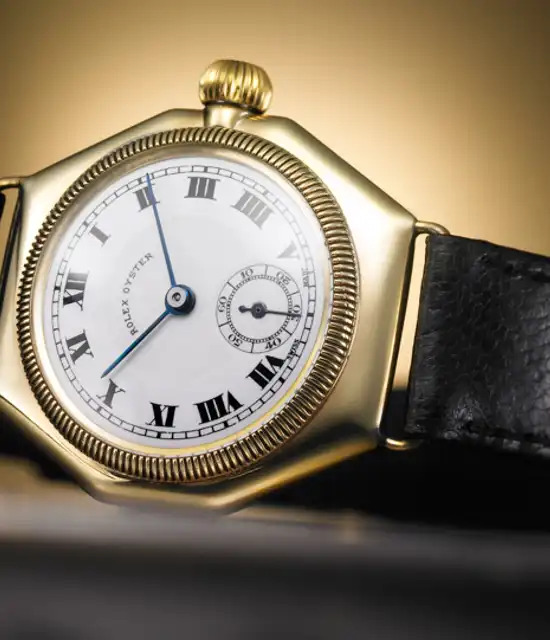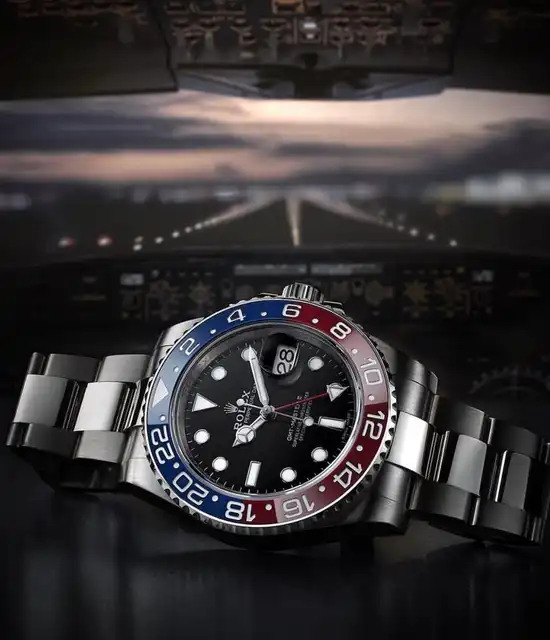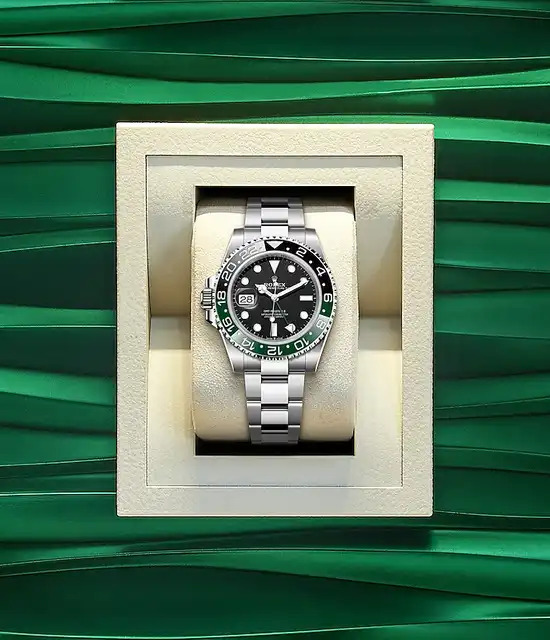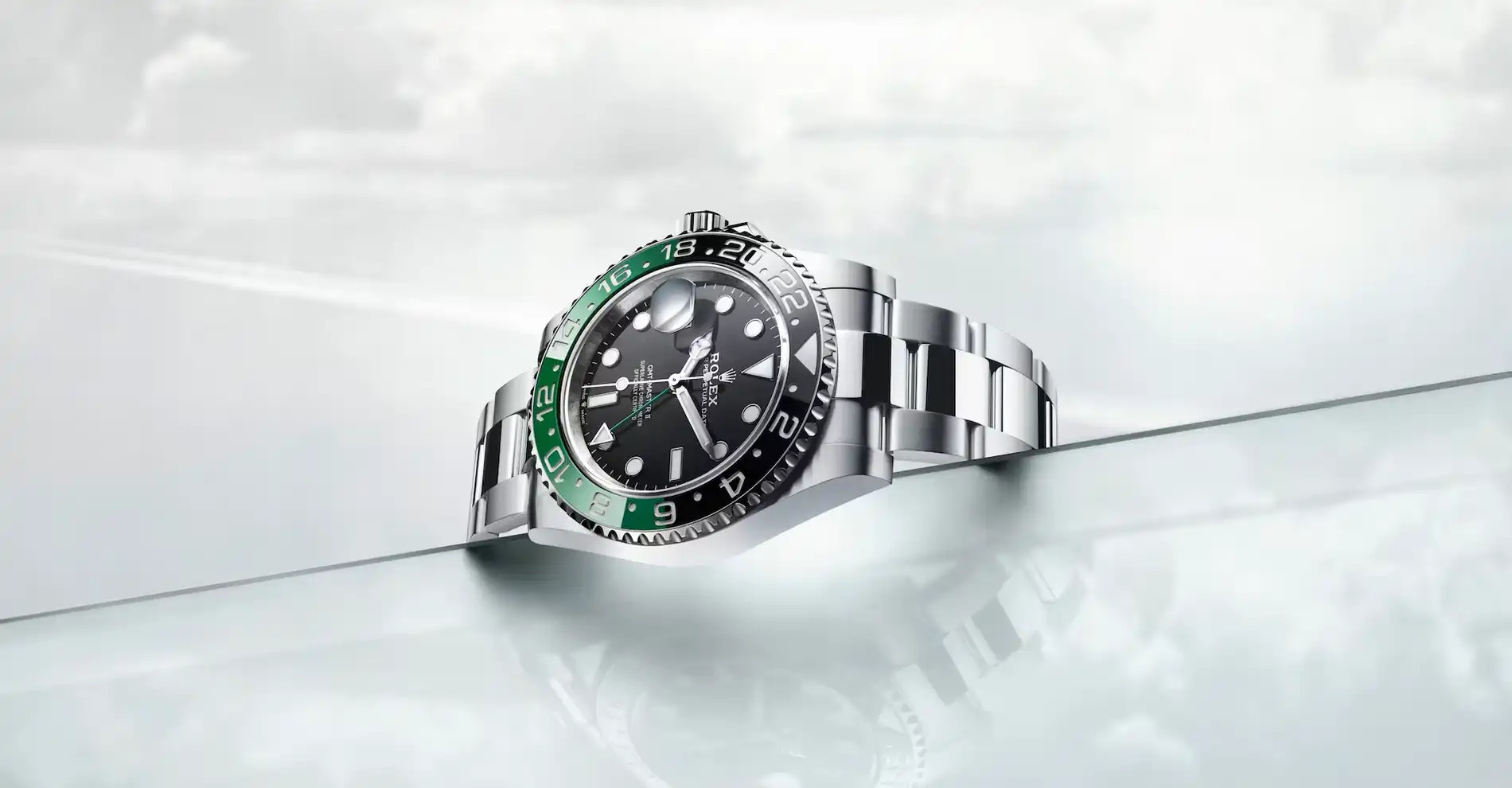Since 1905, luxury watchmaker Rolex has been selling its illustrious models all over the world. The firm’s Swiss watches, and in particular the Oyster model, have acquired a reputation and an aura that go far beyond their function: true legends of design, these exceptional wristwatches symbolise excellent craftsmanship. Let’s look back at ten of the brand’s most iconic models.
Rolex Oyster
Date of creation: 1926
Price: from €5,500 to €6,350
If only one should remain… The Rolex Oyster, created by Hans Wilsdorf, the brand’s founder, first aroused curiosity in a shop window. To promote the first waterproof and dustproof watch in history and to demonstrate its incredible quality, the Swiss firm had created an aquarium display, with a real goldfish inside. This original model (still manufactured in a Perpetual version) has long represented the classic Rolex shape, inspiring fashion and the world of sport.

Rolex Oyster Perpetual
Date of creation: 1931
Price: from €5,500 to €6,350
On the first Oyster models, the crown had to be unscrewed in order to wind the mechanism. This manoeuvre had to be performed every day and, as a result, could eventually weaken the waterproof quality of the model. In the early 1930s, Hans Wilsdorf made a spectacular modification and launched the Rolex Oyster Perpetual, the world’s first self-winding wristwatch. The second watchmaking revolution from the Swiss manufacturer, this mechanism, which uses wrist movements, contributed to the company’s reputation for innovation and quality. Today, the Oyster Perpetual is the Rolex par excellence, with eight decades of expertise and a host of variations having gone into its timeless design.

Rolex Tiffany
A “Rolex Tiffany” was originally a Rolex with a second stamp: in addition to the watch brand, the famous New York jeweller added its logo directly to the dial. Today, some limited-edition Oyster Perpetuals also bear the “Tiffany blue“, a turquoise shade patented by the American jeweller and used as the identifying mark for Tiffany creations.

Rolex Datejust
Date of creation: 1945
Price: from €8,800 to €12,100 (or on request)
Knowing the time without having to wind the watch mechanism was already a great innovation. At the end of the war, Rolex changed things again, this time by offering a date display directly on the dial of a watch. The Rolex Datejust (more precisely the Rolex Oyster Perpetual Datejust) was born. It was also with this model that the famous Jubilee bracelet was introduced, featuring rows of five-piece metal links.

Rolex Lady-Datejust
Date of creation: 1957
Price: from €6,850 to €35,150
The history of Rolex is, of course, closely linked to women’s watches. Initially, the brand manufactured gala watches for them. Then, in late 1927, female swimmer Mercedes Gleitze popularised the Rolex Oyster by wearing it to swim across the Channel. In the 1950s, the Swiss brand also adapted one of its flagship models to create the Rolex Lady-Datejust, which has become one of the most famous Rolex watches for ladies.

Rolex Day Date
Date of creation: 1956
Price: from €37,600 to €41,100 (or on request)
In 1956, the internal mechanics of Rolex watches evolved further, with the day of the week displayed on the Rolex Day Date, as well as the date. In addition to this technological innovation, this model also got a new bracelet: the Rolex President. The name of this precious-metal bracelet with three-piece links befits its famous wearers. From Lyndon Johnson and Gerald Ford to Donald Trump (even the Dalai Lama), the Rolex Day Date has won over American and world leaders, helping to make it one of the most prestigious Rolexes.

Rolex Daytona
Date of creation: 1963
Price: from €14,950 to €32,500 (or on request)
With three counters forming a “panda“, a bezel displaying the units per hour, and a clean, sporty design, there’s no doubt that the Rolex Cosmograph Daytona, or more simply the Rolex Daytona, is built for racing and performance. Associated with actor Paul Newman and designed for racing drivers, this model is renowned for its precision, reliability and a design that’s symbolic of speed.

Rolex Rainbow
The Rolex Rainbow model, or Rolex Oyster Perpetual Cosmograph Daytona Rainbow for purists, is a more vibrant version of the iconic racing watch. The tachymeter bezel has been replaced by precious stones in the colours of the rainbow, offering a particularly bright look!

Rolex Explorer
Date of creation: 1953
Price: from €7,150 to €11,650
It’s thanks to the Rolex Explorer, worn on the wrists of Edmund Hillary and Tenzing Norgay on 29 May 1953, that we know the precise time that man took his first steps on the summit of Mount Everest (11.30 am). This legendary model, built for the most extreme conditions, has since acquired a status of its own among the many ranges offered by the Swiss manufacturer. A second version, the Rolex Explorer II, was a favourite among the great mountain climbers of the 1970s.

Rolex GMT Master
Date of creation: 1954
Price: from €10,550 to €40,200
A watch capable of defying geographical limits: such is the symbolic significance of the Rolex GMT Master, created in particular for air travel. Few devices were able to display the time in two time zones as easily as they do today. An additional hand and a bezel engraved with 24 hours (instead of the traditional 12) were used to keep track of the time on both the continent of departure and the continent of arrival. Pilots and other flight crews were therefore very keen on the watch. GMT refers to “Greenwich Mean Time”, and has become the common acronym for a wristwatch showing two time zones on the same dial.

Rolex GMT Master II
Date of creation: 1980
Price: from €10,801 to €42,500
Reissued in a new format in 1980, the GMT Master was transformed into the GMT Master II: in principle, it remains faithful to its ancestor, but has been equipped with a number of luxurious variations over the years. Part of Rolex’s professional range, this model, with its 24-hour crown, is a symbol of precision, travel and luxury.

Rolex Pepsi
With its original blue and red bezel (initially the colours of Pan Am, the airline that ordered the GMT Master from Rolex), the classic version of the GMT Master II is nicknamed “Pepsi” because of how closely these shades resemble the logo of the famous American drink brand.

Rolex Sprite
One of the latest coloured versions of the GMT Master II has been nicknamed “Sprite” because of its bright green colour, similar to the logo of the famous lemonade brand, which adorns the bottom of its bezel.

Rolex Submariner
Date of creation: 1953
Price: from €9,050 to €38,600
From the outset, the Rolex Submariner has been the jewel in the crown of divers’ watches, with features that were ahead of its time. Able to withstand a depth of 100 metres as early as 1953, and incorporating a graduated rotatable bezel and luminescent hands, this model has gone from strength to strength ever since. Today, a triple watertight system, waterproofness to a depth of 300 metres(!) and a Chromalight display complete the highly technical features of this iconic model.

Fun facts and Rolex history
What is the most expensive Rolex watch sold at auction? The Rolex Daytona 6263, sold for $17.8 million. This spectacular fact befits the legend forged by the brand since its origins. It is the only brand that can claim to have told its wearer the time at the highest point on Earth, but also at the deepest level of the ocean: when exploring the Mariana Trench at a depth of more than 12 kilometres, James Cameron pushed the water resistance of the Rolex Deepsea Challenge to the limit by attaching it to one of the centre boards of his submarine… The watch rose to the challenge, withstanding the immense pressure outside the submersible!
Whether involved in the world of sport, cinema, adventure or diving, Rolex always relies on prestigious ambassadors: after Martin Luther King, several American presidents, Marlon Brando, Maria Callas and Andy Warhol, famous figures such as Roger Federer, opera singer Cecilia Bartoli and Michael Bublé are today among the wearers of these exceptional watches, which are always handmade!
How to spot a real or fake Rolex
It is by comparing the details that the subtle differences between a genuine Rolex and a counterfeit can be can detected. Ideally, you should be able to look at an official dial and strap, either on the Internet or via someone who owns an authentic watch, in order to check that the font of the inscriptions is perfectly clear and that the spacing is proportionate… Another sign: the fluidity of movement of the second hand, the relatively heavy weight (counterfeits are often lighter) or the water-resistance (more fallible in imitations) can be good clues. To go even further, checking the serial number and visiting a professional watchmaker are highly recommended if in doubt!
Source: Monte-Carlo SBM

Coffee Time journal
Твой журнал на каждый день!






